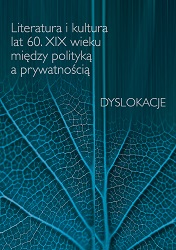Galicyjska lekcja roku 1863. Powstanie jako narodowe samobójstwo – w kręgu stańczykowskich metafor i diagnoz
The Galician Lesson of 1863. The Uprising as a National Suicide (Stańczyk Metaphors and Diagnoses)
Author(s): Iwona Węgrzyn
Subject(s): Studies of Literature, Polish Literature, 19th Century
Published by: Wydawnictwa Uniwersytetu Warszawskiego
Keywords: January Uprising; post-insurgent trauma; conservative elite; Cracow; ethos
Summary/Abstract: The paper analyses works by members of the late 19th century Cracow conservative elite,in which their struggle with the post-insurgent trauma of the January Uprising in 1863 can beobserved. Deeply involved in the movement, they later adopted a critical attitude towards it. Inthe works of J. Klaczko, S. Tarnowski, P. Popiel, and above all, S. Koźmian’s Rzecz o roku 1863(written on the 30th anniversary of the Uprising), they use the gesture of suicide as the centralmetaphor of the the Uprising. This suicide was ‘committed’ collectively by people, who hadknown that their fi ght was doomed, but who were unable to oppose the pressure of honor andtradition. The metaphor – as irrational as the more dominant discourses of romantic messianismor martydom of sacrifi ce – hindered a rational discussion of the causes and effects of the Uprising.However, it enabled people involved (or even those, who only gave their tacit consent), to confrontthe trauma of guilt and personal and collective responsibility for the tragedy.This critisism of the insurgency by people, who had a moral right to judge it, is an importantpart of the discussion of the Polish civil and patriotic ethos.
Book: Literatura i kultura lat 60. XIX wieku między polityką a prywatnością. Dyslokacje
- Page Range: 43-55
- Page Count: 12
- Publication Year: 2019
- Language: Polish
- Content File-PDF

